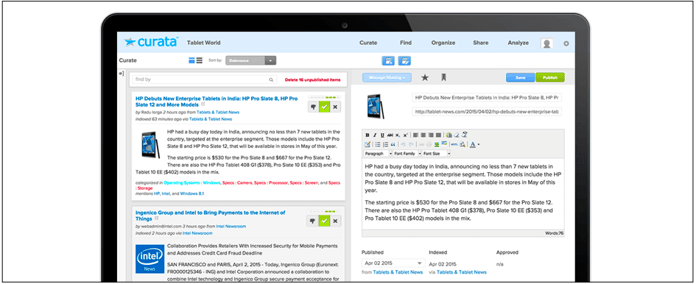This post is part of our Spotlight series featuring AI-powered companies and products that marketers can use to drive performance and transform their careers.
Who doesn’t want to generate more content—and more effective content—in less time?
In a nutshell, that’s the goal of Curata (@curata), software that uses artificial intelligence to curate and distribute the most high-quality content—then measure its impact.
The software uses machine learning and natural language processing to parse through online content, and  categorize the most relevant and popular options for a company’s audience. It then offers content marketing management and measurement to illustrate how content marketing impacts company goals.
categorize the most relevant and popular options for a company’s audience. It then offers content marketing management and measurement to illustrate how content marketing impacts company goals.
We learned how by talking to Pawan Deshpande (@TweetsFromPawan), CEO of Curata, about how AI in content marketing like Curata works.
In a single sentence or statement, describe Curata.
Curata software allows users to easily find and distribute high quality third party content, to keep all relevant stakeholders on the same page throughout a project, and to accurately analyze content’s impact on revenue through all stages of the funnel.
Curata offers two products for content marketers: a content marketing platform (CMP) and content curation software (CCS).

How does the company use artificial intelligence (i.e. machine learning, natural language generation, natural language processing, deep learning, etc.)?
Curata utilizes informational retrieval techniques, machine learning and natural language processing techniques for a variety of tasks:
- The discovery engine self-optimizes and learns a user’s content preferences.
- Detects duplicate and redundant content for curation.
- Extracts and infers metadata about content, such as who is being mentioned, videos, images and relevant quotations.
- Automatically filters out irrelevant content.
- Automatically learns how to categorize and classify content.
- Predicts future content contribution to social, web traffic, lead generation, sales pipeline and revenue.
What do you see as the limitations of artificial intelligence as it exists today?
In the 1980s there were “expert systems” that were considered artificial intelligence. They had completely hard-coded rules, but we’ve now moved beyond that to statistical models to predict outcomes. AI now is basically just algorithms most people don’t fully understand yet. For example, ten years ago Google Maps used to be considered “artificial intelligence.” Now it’s considered basic.
Reliable sentiment analysis (i.e. figuring out if a sentence is happy, sad or sarcastic) is really hard for artificial intelligence, along with reliable sentence parsing. Visually recognizing a tea cup reliably is challenging for current machine vision algorithms. Folding laundry is another incredibly hard task for artificial intelligence powered robots. The human intuitions underlying what data to look for and what questions to ask are some of the biggest limits now.
Another limitation is the ability to operate on very small amounts of evidence or data. For example, if you look at a lot of the bioinformatics applications, each piece of data is a patient’s DNA. In those cases you don’t have a lot of data, so it’s very difficult for researchers to figure out which genes correlate with illness.
Another difficulty for AI is trying to optimize for multiple dependent outcomes concurrently. Let’s say you want to optimize two conversion rates simultaneously; that becomes very complex and difficult very fast. Imagine you’re A/B testing for a landing page, and there’s another algorithm that varies the ad creative that draws people to the landing page in the first place. The way to do that now is to do both independently of each other, because doing both at once quickly becomes computationally intractable.
Right now, machine learning models need you to input attributes in order to make a prediction. In the future, you will tell it what outcome you want to predict, and it will tell you which attributes to look for in the first place.
What do you see as the future potential of artificial intelligence in marketing?
Lookalike modelling. There’s one application for account-based marketing where you find a target account that has become a customer or has converted to an opportunity, and use that as a seed for an artificial intelligence algorithm to find other similar companies for a sales or marketing team to target.
Another application for artificial intelligence in marketing is to use collaborative filtering. These are the algorithms Amazon uses to recommend products based on what other users have purchased. In the B2B marketing world, similar algorithms can be used to recommend content or offers to buyers, based on what’s worked well for similar users.
Lead scoring and account prioritization is another avenue: we can use machine learning to learn which leads have purchased in the past, and then prioritize other similar leads.
Another area is using natural language generation to automatically repurpose content by creating similar content that has the same core message but different wording.
What makes Curata different than competing or traditional solutions?
Traditional solutions are very much a duct tape method for curation, where someone uses a feed reader or Google alerts. A feed reader is simply a firehose of content with no filtering capabilities or ability to personalize content. You have to use at least one or two other programs to annotate and distribute that content with a lot of copy-and-pasting in between.
Curata CCS is an all-in-one software package that discovers, filters out the noise, sanitizes the text that displays, extracts metadata, automatically summarizes, and makes it easy to review, curate, publish and promote. Most importantly, throughout the process it uses machine learning to self-optimize and learn your preferences to find better content.
For analytics, the traditional solution is to juggle multiple data systems such as social media tools, Google Analytics, marketing automation and CRM systems to attempt to get a complete picture of content’s impact on the full funnel. Needless to say, this is inefficient. By contrast, Curata CMP is an integrated package that automatically and accurately measures data from all the aforementioned sources with added predictive capabilities to forecast future content performance.
Who are the prototype customers in terms of company size and industries?
Curata is content and language agnostic, working for customers in every vertical, in every language, and for B2B and B2C companies of all sizes.
What are the primary use cases of Curata for marketers?
For marketers who need more content and can’t produce enough on their own, they need to curate. Or they need more engaging third party content so it isn’t all egocentric , self-produced content. It’s also for marketers who need an integrated editorial calendar and comprehensive content performance measurement.
Any other thoughts on AI in marketing, or advice for marketers who are just starting to explore the possibilities of AI?
It’s not just about the algorithms, it’s about the availability and cleanliness of your data as well. Ten years ago when I worked at Google, Google Translate had the best accuracy for both Chinese and Arabic. The underlying reason was not that the algorithms were better tuned for these languages, but that thanks to the U.S. Department of Defense, researchers had the most translated text available for these two languages.
Paul Roetzer
Paul Roetzer is founder and CEO of Marketing AI Institute. He is the author of Marketing Artificial Intelligence (Matt Holt Books, 2022) The Marketing Performance Blueprint (Wiley, 2014) and The Marketing Agency Blueprint (Wiley, 2012); and creator of the Marketing AI Conference (MAICON).


